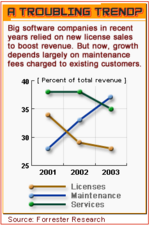Everyone is talking about the slowdown of growth in the enterprise software sector as one of the main reasons driving consolidation talks at companies like Oracle/Peoplesoft and Microsoft/SAP. We all know that the enterprise software business characterized by large licenses and 20% annual maintenance revenue is lucrative but also hard as the big get bigger and the little guys disappear. Given the number of negative preannouncements this week from enterprise software companies, this Forrester graph from a CNET article summarizes the market quite well.
Looking at this graph, it is no surprise that companies are looking to consolidate. Given that maintenance revenue is such a large percentage of overall revenue and growing and given that it is also highly profitable, why shouldn’t some larger players in the market consolidate the industry, keep the maintenance revenue and cash flow, and stop everything else? With that backdrop, I find it quite interesting to learn that CA’s ex-CEO, Sanjay Kumar (the master of these deals), advised Oracle on their Peoplesoft acquisition. According to a New York Newsday article, here is what Sanjay had to say on Oracle’s strategy of buying Peoplesoft and gutting it:
At the same time, Phillips said Kumar advised “he would have the same plan post acquisition but just would not have said so up front. Everyone knows but you can’t say it and freak out the customers up front.”
As for which employees to keep and which to discard, Kumar, whose CA acquisitions were notorious for scuttling thousands of workers, offered clear advice.
“Don’t get rid of the presales folks; only the sales,” Phillips quoted him as saying. “The presales guys know the products and customers and they will get you easy add-on sales . . . and it would be crazy to forgo that revenue and those relationships . . . You don’t need the sales guy — those are for new account hunting.”
What does this mean for me from a venture perspective? Well, what I have believed for a long time is that it is hard for early stage companies to build direct sales models predicated on “elephant hunting” and going after huge deals. Each sale is incredibly long and expensive. In addition, as you can see from a number of large public software companies, revenue is lumpy and therefore less predictable as customers wait until the last day of the quarter to squeeze you for a larger discount. Despite this, we are still bullish on software companies selling to enterprises. In our mind it just requires a rethinking of what business models will work and why. Think seed and harvest – lower price points, more volume, lots of upsell over time. Think of software models with leverage – hosted software and modular software which can be resold, OEMed, and/or appliancized (if that is a word). So please read an earlier post for more detail.

I work in the industry on the VAR side of the business selling Best Software solutions (mostly mid-market). We have found that elephants are hard to find. No kidding right. The point is that lowering price is not the way to go once you do find them. Price is not the major objection that this group has to buying.
They need functionality first and foremost, and they need to see that once the solution is implemented, it will be easy to use and maintain.
Selling on VALUE in this marketplace is the only way to succeed. Make sure that the prospective client understands what you really bring to the table and how the solution will help them in the end.
From a VC standpoint, I would look for companies (VARS/Resellers) of these solutions that have the right vision, and are capable of following through on value.
I constantly see technicians and consultants take their try at being a business owner. The problem is, they know how to install and fix. However, they don’t know how to run a business and take care of customers thus creating value.
That is my two cents….